The End Appears Nigh for Mubarak
The Egyptian army has publicly ruled out a use of force.
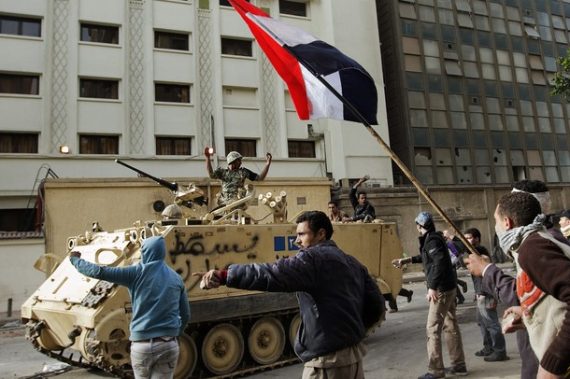 Via the BBC: Egypt army rules out using force
Via the BBC: Egypt army rules out using force
Egypt’s army has vowed it will not use force against the tens of thousands of people protesting for the removal of the regime of President Hosni Mubarak.
It said it respected the “legitimate rights of the people”.
The statement comes ahead of a massive march planned for Cairo on Tuesday and amid a call for a general strike.
Al Jazeera has more of the statement:
In a statement on Monday the army said “freedom of expression” was guaranteed to all citizens using peaceful means.
“To the great people of Egypt, your armed forces, acknowledging the legitimate rights of the people,” stress that “they have not and will not use force against the Egyptian people,” the statement.
It was the first such explicit confirmation by the army that it would not fire at demonstrators who have taken to the streets of Egypt and comes a day before Tuesday’s “march of millions”.
“The presence of the army in the streets is for your sake and to ensure your safety and wellbeing. The armed forces will not resort to use of force against our great people,
“Your armed forces, who are aware of the legitimacy of your demands and are keen to assume their responsibility in protecting the nation and the citizens, affirms that freedom of expression through peaceful means is guaranteed to everybody.” the army statement said.
It urged people not to resort to acts of sabotage that violate security and destroy public and private property. It warned that it would not allow outlaws to loot, attack and “terrorise citizens”.
This is stunning and highly significant. The regime’s ace in the hole was the chance that the military would actually fire on the protesters. With that possibility taken off the table, the populace will only be emboldened. Further, it is difficult to see how Mubarak can stay in power if the army is willing to publicly undermine his position, which is what they have done. The police remain an x-factor, but at the moment it would appear that a move by the police could spark a response from the army.
The lynchpin in all of these types of circumstances is the coercive apparatuses of the state (i.e., the military and the police) and the military appears to have made their choice: they are not willing to attack their fellow citizens on behalf of the regime. It has been telling for days that the military has been deployed amongst the protestors without a crackdown and the statement today simply confirms their disposition.
The removal of possible military action will simply mean that tomorrow’s planned march will probably be even bigger than it otherwise would have been, as the more timid are now more likely to join in the demonstrations. See more at al Jazeera: Egyptians gear for gigantic protest.
Further, the following indicates that, at a minimum, Mubarak knows he is in trouble, even if the reality of the situation has not fully sunk in as yet:
Meanwhile, new Vice President Omar Suleiman said Mr Mubarak had asked him to open dialogue with all political parties on constitutional reform.
See more at the NYT: Vice President Agrees to Talk With Opposition.

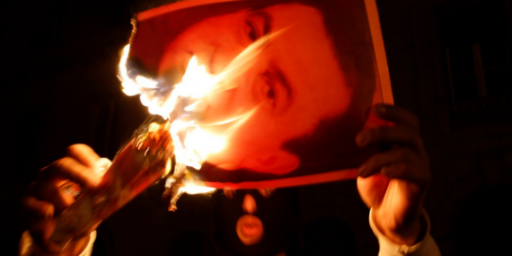
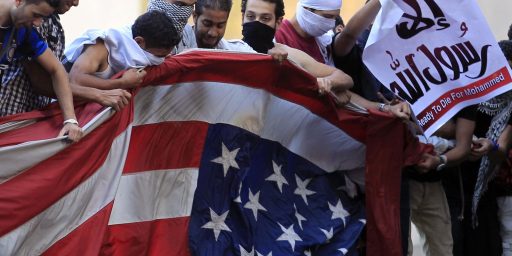

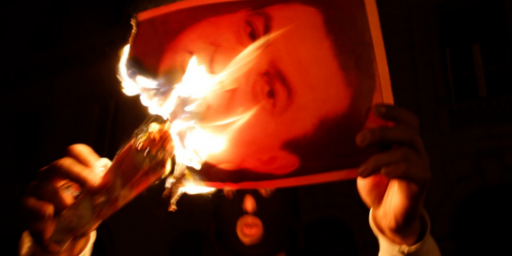
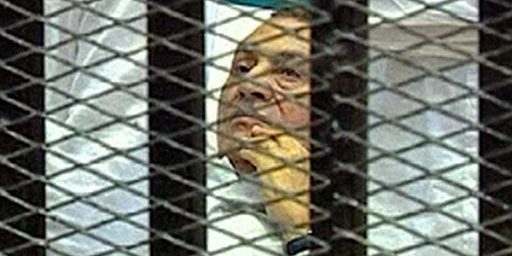
90% chance Mubarak is gone. Let’s hope something better takes his place. And let’s NOT let him come here.
Oh, man, I hate it when life forces me to experience actual hope.
We’re all dead in the long run.
I bet Mubarak is still running Egypt at the end of the year.
It’s not a bad time to take a moment to remember Anwar Sadat, who actually had the balls to change things for the better…
***Oh, man, I hate it when life forces me to experience actual hope.***ditto….
***It’s not a bad time to take a moment to remember Anwar Sadat, who actually had the balls to change things for the better…***ditto……
Every day Mubarak stays in power his likelihood of remaining for the long term increases. I actually see the military refusing to fire upon people as a sign of the regimes confidence and a way to diffuse some tension. If the military remains passive the level of violence from the demonstrators may very well stay low.
The Egyptian military seems to have plenty of food and water…the protesters seem to be running out.
Checkmate?
Several points:
1. Repeating the observation I made yesterday, major revolutions (and if what’s going on in Egypt right now turns into a revolution it will count as major) don’t take place overnight but unfold over the period of months or even years.
2. There’s considerable distance between the reluctance of the army to fire on peaceful demonstrators and a willingness to allow the demonstrators to take over the apparatus of government.
3. The outcomes of the French, Russian, and Chinese revolutions were not determined by the regular army joining the demonstrators but by the regular army fracturing and revolutionary militias being raised.
4. The only organized opposition in Egypt of any real note is the Muslim Brotherhood.
5. Does Mohammed ElBaradei have any more standing within Egypt than Chalabi had in Iraq?
We’ve reached a point where the US could actually tip this thing. The army survives on American money. I suspect what we’ve done behind the scenes is to draw a line at the army firing on demonstrators.
Are we willing to inform generals that we’ll cut funds unless Mubarak steps down in favor of an interim government? And is that the smart play now?
It depends on whether such a threat would work, and whether we’d prefer an interim military/El Baradei government.
I wonder what the Saudis and Netanyahu are telling us.
@Dave:
I concur that the overall pattern of change in a given case is a lengthy affair. I am far from being willing to dub this a revolution, even a burgeoning one, as that cannot be determined until a) there is an actual change in power, and b) we see the nature of that change
However, I would point out that the disposition of the armed forces has been a key factor in every major revolution/cases of major change of this nature (as I would reserve the term “revolution” to a very small set of actual historical events). And you do rightly note the fracturing thereof in several prior examples.
It is less that I see the military joining the protesters, as I find it rather key that they were willing to say, up front, that they would not use force. There was no reason to do so if the goal here was simply to wait this out.
My initial inclination when all of this started was that Mubarak had sufficient control of the state, and specifically its coercive capability, that his removal was ultimately unlikely. The subsequent behavior of the military has changed my opinion, however, of his long-term prospects. Beyond that, I am no prepared to assume anything about where this all goes.
Consider:
I agree that the Egyptian military’s announcement that it won’t fire on peaceful demonstrators is significant. There’s plenty of wiggle room in the statement, e. g. “peaceful”, “demonstrators”.
The best that can be hoped for is a managed transition and it’s pretty hard for me to see how that comes about at this point, especially with the Muslim Brotherhood’s declamation that Mubarak’s exit is the starting point for negotiations.
@Dave:
I think we are in basic agreement. I certainly have made no pronouncements about what comes next, save that I really am starting to think that Mubarak will be gone at some point relatively soon.
There are a number of possible paths forward, and none are easy.
I’m not sure the pessimists are right.
The army is the main player. So I’ll write a scenario for you:
The Army tells Hosni it’s time to go. The army designates a respected general — someone the people and the forces both like — to act as guarantor of a transitional government. Free and fair elections and so on.
We, the EU, and the Asian powers agree to pony up enough cash to soften a bit of the economic pressure. 80 million people, we subsidize with $25 a head, (2 billion) that’s a hundred dollars or more for a fellah family living on nothing or a Cairo student just getting by. That gives the new government some breathing space for a couple of years.
The worldwide economy picks up. Food prices conveniently drop. Tourism income rises.
It’s not Canada, but the Egyptian people figure, well, it’s better than it was.
I think that’s a more likely scenario than that ElBaradei heads a transitional government. I have no idea whether there is such a general.
Food prices probably won’t drop as investors seem determined to turn the commodities market into the next housing market…
Matt, Absolutely correct. Hedge funds and large speculators are fomenting global unrest here and abroad. Europe is realizing it yet our own Commodities Futures trading Commission sits on it’s hands. Hedge funds are a recent creation in the financial markets and so far they have done nothing good and plenty bad. It’s time to take another look at the legislation authorizing such entities.